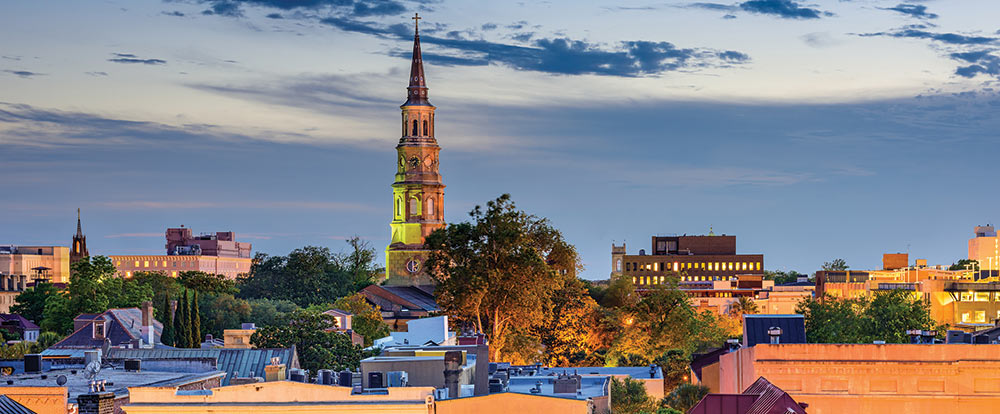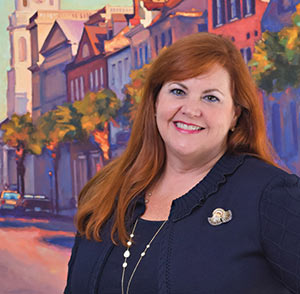
In Charleston, there is a Hill that draws visitors and tourists from all corners of the globe. No hills around Charleston, you say? Well, that’s mostly true, but there is a Helen Hill at the helm of the Charleston Area Convention and Visitors Bureau (CACVB), and it’s not only her job, but her passion to bring people to the Lowcountry – in turn, spinning the gears of the local job market and economy. After the blow to nearly every sector amidst the current global pandemic, rebuilding the impact that tourists have here will be a mountainous task, but Hill is optimistic about the uphill battle.

She attributed her optimism to Charleston’s history of rebounding in the wake of other life-altering events. The Charleston native began her career with the CACVB in 1986, and was named CEO just two weeks before one of Charleston’s most notorious of devastations: Hurricane Hugo.
“Forty percent of things were damaged. It was a really, really, really hard time, but people had spirit,” she explained.
As time continued, she noticed that the hospitality industry had changed because the workers and business owners had weathered the storm’s aftermath together. Over the course of her CACVB tenure, she has seen the Lowcountry come together through other historic events, like the Navy base closure in the 1990s, the Sofa Super Store fire and the Mother Emanuel tragedy.
“I have seen how our community can pull together through some of the most horrific, horrible things. I’m hopeful that 10 years from now, when we look back on COVID-19, we’ll say, ‘Gosh, it really brought our community together in a way never done before.’ Look at technology – a lot of businesses haven’t missed a beat because people are working from home. A lot of people are still interested in our community — the pipeline hasn’t exactly slowed down, it’s just changed.”
In terms of today’s market, Hill and her team at the CACVB are working harder than ever to restore the tourism industry because it drives our local economy. The College of Charleston’s Office of Tourism Analysis estimated that the pandemic’s economic impact to Charleston was over a billion dollars in only the first two months, and our region saw hotel occupancy rates drop from approximately 85% in recent years to under 15%, while hospitality industry unemployment skyrocketed to 65%. Fortunately, at the time this article was written, occupancy rates were climbing again, and hotels that were temporarily closed were reopened.
“Our whole goal is to get someone to spend the night,” Hill said. “Our great impact for the community – starting with the job and the economic impact it creates – it all starts with someone choosing to spend the night here.”
She explained that our area benefits from diverse options, like beaches and a downtown area that can appeal to a variety of groups, from business meeting opportunities to vacationers. Hill also noted that the area’s outdoor-related venues are the ones that sold out first this summer. “When you think about taking your family somewhere now, you want to be outside in a kayak or something similar. It’s great for our community because we have a lot of that product.”
Currently, the CACVB is focusing more on the drive market than the air market, since COVID-19 has caused a significant decrease in air travel. Pre-pandemic, Hill and the CACVB defined the drive market to be within a four-hour driving radius, but in the current market, their research shows the drive market range has doubled — people are now eager to drive up to eight hours to visit our charming locale.
“Balancing the safety and security of our visitors is the most paramount,” she continued. “People are asking about cleanliness and safety for restaurants and attractions and hotels; the average person on the street doesn’t know that restaurants and hotels have the same DHEC standards as hospitals. It’s been rewarding, in our industry, when people find out what we already do.”
Though the future is hard to predict when dealing with an unprecedented global pandemic, Hill and her team look toward it positively and realistically. “I think 2020 will be a year we would all like to forget, but I do think that we will come back strong in 2021 if there is a vaccination or if the virus becomes more controlled,” she said, adding that one challenge will be having people become used to a new normal of washing hands frequently and wearing masks.
“The good part is that, unlike a hurricane, we’re not having to physically build back; that’s hard after any kind of storm, with beach erosion and buildings damaged. We’re lucky that all the things that make us who we are are still here.”
By Anne Shuler Toole